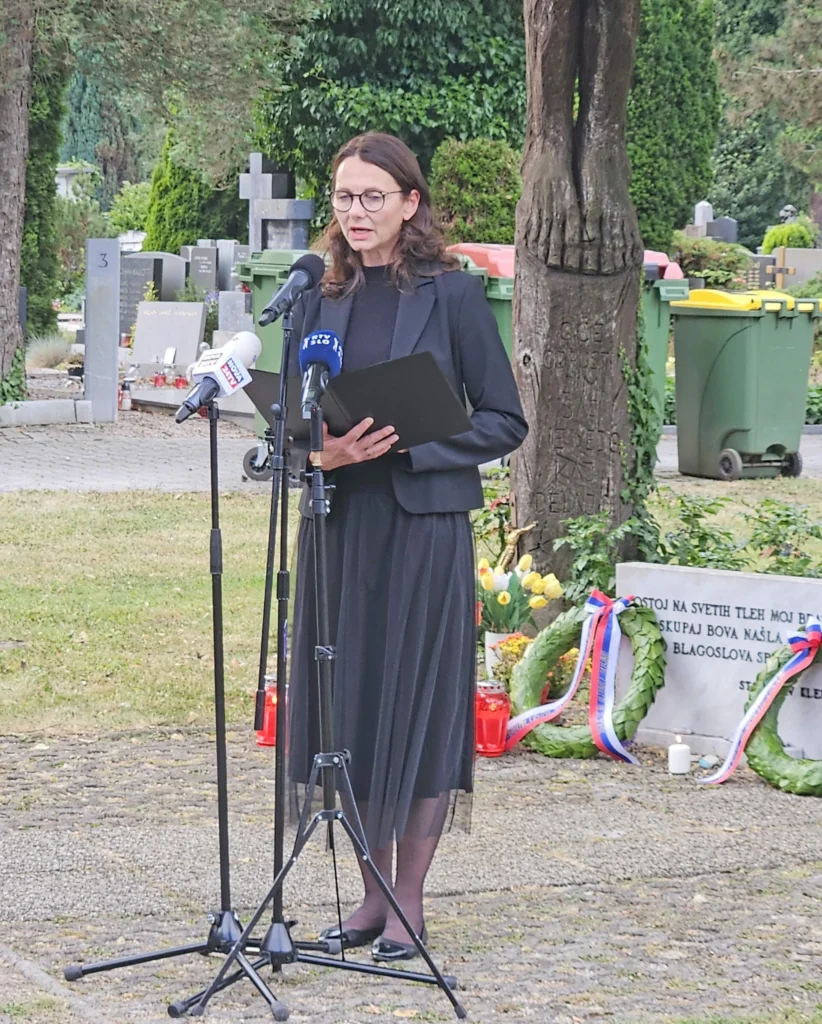The United at the Linden Tree of Reconciliation Association (Združeni ob Lipi sprave), which has been working hard for many years for a dignified burial of victims of post-war violence and for the regularisation of the graves of those killed extrajudicially, has designated the 15th of June as the Day of Guilt, Forgiveness and Reconciliation. This day is dedicated to the memory of the post-war massacres that followed the end of the Second World War. This year, on the 80th anniversary of the end of the war, a ceremony was held at the Linden Tree of Reconciliation in Ljubljana – to remember, mourn and call for national reconciliation.
The event was attended by representatives of religious, academic and civil society circles. Dr Mateja Prevc Rozman from the Faculty of Theology in Ljubljana addressed those gathered at the event with a clear message: “We are gathered to commemorate and pay our respects to the victims of war and revolution – the victims whose rights and human dignity were willingly, deliberately, intentionally and systematically violated. A wreath was laid at the Žale cemetery in memory of the victims of communist violence, and we also said a prayer for them.”
The Auxiliary Bishop of Ljubljana, Dr Anton Jamnik, stressed the importance of prayer and inclusive love. “Let us pray for everyone, because God’s love does not exclude anyone. At the same time, it is prayer that gives us the strength to believe in the gift of the grace of reconciliation, which is God’s work alongside all our human efforts. The linden tree has a special significance because it has long been Slovenia’s national tree and symbolises several things.”
Abuse of power by the ruling class
The Linden Tree of Reconciliation, planted in the Park of St Urh and transplanted in front of the Presidential Palace, is more than a symbol, according to Mateja Prevc Rozman. “It is a silent and pleading but also clear call for healing the wounds that the former totalitarian regime, with its Mephistophelian sword of division, cut into the nation’s being, causing a division that – unfortunately – continues to this day.”
Speakers recalled that any totalitarianism – whether fascist, Nazi or communist – erodes fundamental human rights and undermines social unity. Rozman was critical of the state’s current attitude towards historical injustices. “The non-recognition or even condoning of criminal, fratricidal killings under the guise of ‘redundancy’ and the absence of fair judicial procedures is an abuse of power by the ruler, who thereby demonstrates his own weak power. A country that cannot condemn the crimes of the former regime cannot be democratic.”
Prevc Rozman also called for a clear attitude towards totalitarian symbols and the naming of public spaces: “A country that cannot ban the use of totalitarian symbols and rename streets, roads, squares and bridges that still bear the names of some of the prominent figures of the totalitarian agenda of the former system cannot be democratic in the full sense of the word.”
The event did not end with warnings, but also carried a message of hope. As Rozman added: “Faith and remembrance of the victims should encourage people to seek the truth, human compassion and also a willingness to cooperate and reconcile.”
Dr Alenka Hofferle Fel concluded the event with her thoughts, recalling the duty of the state towards its citizens: “This is a difficult and long journey. It is the duty of a democratic state to condemn the guilty and defend the rights of victims and all citizens – even today. It should give the victims a dignified burial, thus ensuring a home for their families and for all of us in our common homeland – Slovenia.”
A. G.


